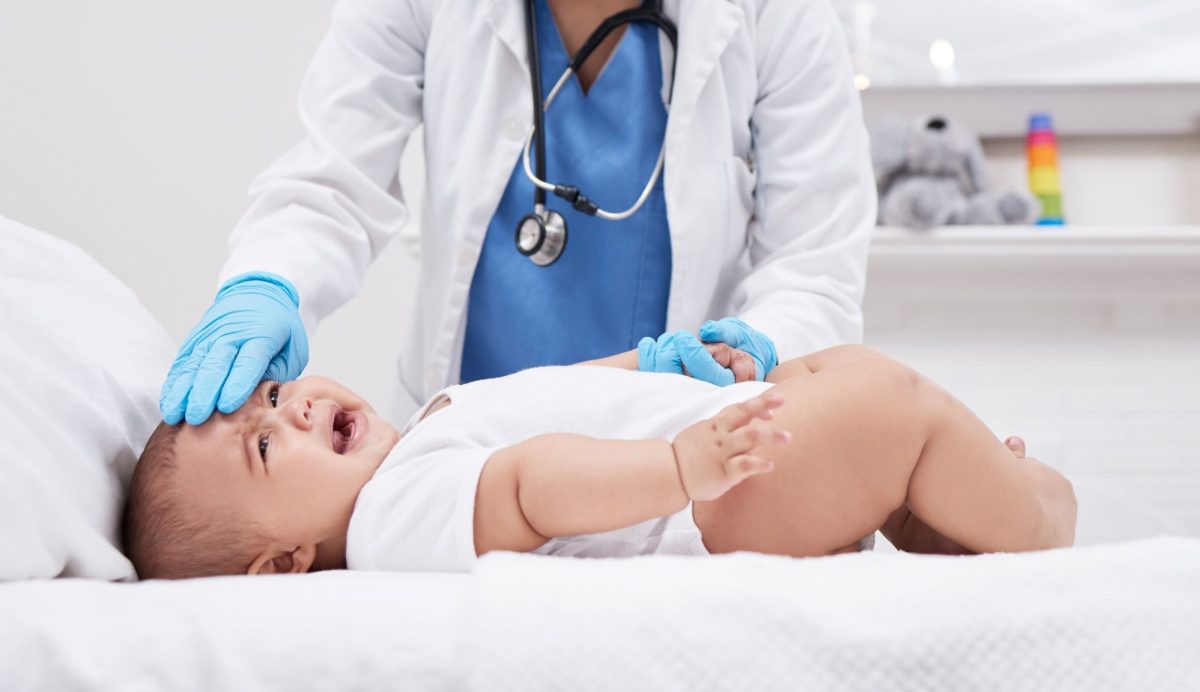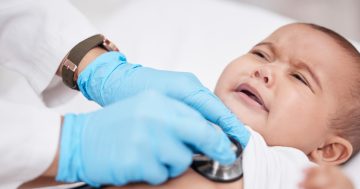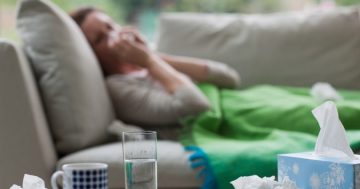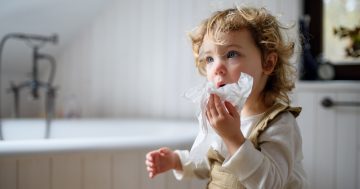
Whooping cough is especially dangerous to babies who haven’t been fully vaccinated. Photo: YuriArcursPeopleimages.
For the first time in a couple of years, whooping cough is on the rise in the Illawarra.
Although winter is traditionally the season when cases of whooping cough (pertussis) increase, in the past couple of years numbers have essentially “flatlined” due to the precautions people were taking against COVID-19.
Illawarra Shoalhaven Local Health District’s (ISLHD) public health director Curtis Gregory said it was usual in the cooler months for health practitioners to see increases in diseases such as flu, RSV and now also COVID.
“We know there’s always a lot of respiratory illnesses around, rhinovirus and pneumonia as well, in winter and the cooler months,” he said.
“The three most common ones we’re seeing at the moment are COVID, RSV and flu and they get grouped because there’s a triplex test that can be done for people presenting with flu-like illnesses.
“But we’ve also seen a rise in whooping cough after a couple of years of pretty much zero cases.
“What we’re concerned about with the rise in whooping cough is that people may not be aware of it, or may not be thinking about it because there’s been such a focus on COVID.”
Whooping cough is a respiratory infection that causes coughing, which can occur in long spells and often ends with a high-pitched “whoop” sound when the child breathes in.
Mr Gregory said whooping cough, which was highly infectious, could be particularly dangerous for babies up to six months as they had not received all three doses of the primary vaccine until that age.
“Up until then, they don’t have any protection unless their mums have had a vaccination during pregnancy,” he said.
“We recommend that mothers get vaccinated around 28 weeks and that allows the antibodies to cross over the placental barrier and provide some protection for the kids up until that six-month period when they can get vaccinated.”
Mr Gregory said the wheezy, strong cough could cause breathing trouble for young children.
“In some very unusual cases, young children won’t cough but they’ll stop breathing and start turning blue from lack of oxygen, so anything with breathing difficulty or changing colour needs urgent medical attention,” he said.
“Some of the older children and adults may have just a mild cough that doesn’t go away but doesn’t have that real signature whoop around it. It often starts like a cold with a runny or blocked nose, developing a fever, the occasional cough, sneezing and so on.
“With young ones particularly, be very careful if the symptoms increase in severity really rapidly and quickly and get medical attention.”

Curtis Gregory says it’s important to take basic steps to avoid contagious illnesses such as COVID, flu or RSV. Photo: ISLHD.
He said it was recommended that people get a whooping cough booster about every 10 years.
“We see a lot of grandparents, aunties, uncles, cousins and so on getting boosters if there’s a new arrival in the family – the first grandchild especially prompts it.”
Mr Gregory said it was highly recommended that children as well as adults had an annual flu vaccination.
“We find that the five and under age group are really quick transmitters of flu because everyone’s pretty interactive with them, picking them up to give them a cuddle and so on,” he said.
“It’s really important that they get protected by having the vaccine and that will protect others as well.
“It’s not too late to get the flu vaccine, we’re expecting the flu season to go on a bit longer beyond July and slowly go down in August and September.”
Mr Gregory said COVID numbers had been steadily climbing in the Illawarra, particularly among teens and adults aged from 30 to the mid-30s, as well as more cases in the 50-plus age group.
“Again, the message around COVID is don’t be complacent and think it won’t affect you because you’re not in the high-vulnerability group,” he said.
“Get your vaccine, get a booster and follow the basic, commonsense precautions about hand hygiene, not going out if you’re sick and being careful when socialising.”
Mr Gregory recommended that vulnerable people speak with their doctor to make a plan about what to do if they started showing symptoms, including the availability of antiviral medications.
Curtis Gregory’s tips to avoid sickness this winter:
- Make sure you, and especially your kids, are up to date with vaccinations. “This not only protects them, it protects brothers and sisters and other family members.”
- If you’re sick, stay home
- If you have to go out, wear a face mask. Stick with clear, open spaces and avoid heavy queuing or heavily populated areas such as supermarket queues
- Practise really good hand hygiene and carry a hand sanitiser with you
- Be very careful about visiting vulnerable or high-risk people – if you’re sick, don’t go and see the elderly or young children because they will pick up things easily.
For more information about respiratory illnesses, visit NSW Health. For information about whooping cough, click here.














